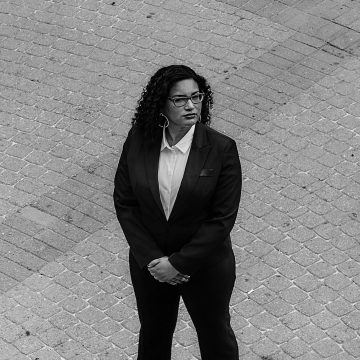LESTER CUELLAR IS ON A QUIET CRUSADE. At least once a month, he arrives at the Centre for Spanish-Speaking Peoples, located on the second floor of a small commercial building at Jane and Wilson. He walks past the group of women gathered in the lobby, and he sets up in a small room. One by one, the women stream into the room, where the 34-year-old family lawyer dispenses legal advice in Spanish. This work is often pro bono, but it’s sometimes funded through Legal Aid Ontario. The women are frequently in desperate circumstances. Most have little education and almost no money; many are trapped in abusive relationships. “People are living in harsh realities,” says Cuellar. “I can’t overstate how substantial the demand is in this area.”
During these consultations, he spends most of his time explaining the absolute basics of the legal system. “You would not believe the level of misinformation that is out there,” he says, “especially when a partner has achieved a certain level of manipulation.” He’s met women who believe that if they file for divorce, the partner who earns the most money will win sole custody of their children. There are women who think that because they receive child-tax benefits, their ex-husband has no obligation to pay child support.
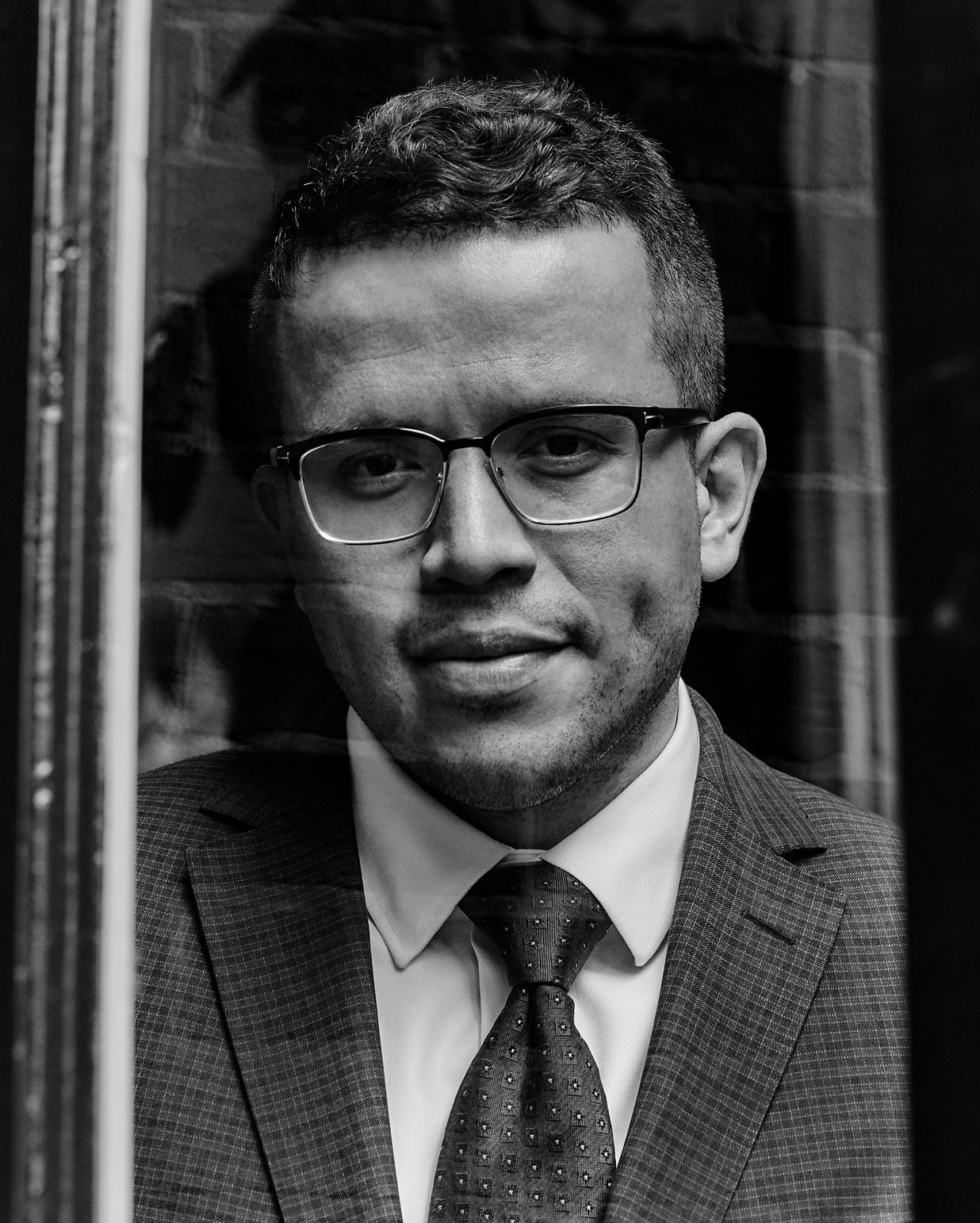
“I found it hard to be impassioned about securities law or about a merger,” says Lester Cuellar. “That path wouldn’t have been good for my soul.”
None of this is true. His goal, then, is to empower these women with legal knowledge that will allow them to make more informed decisions. “Though some of the women I meet in consultations become clients, I don’t have the capacity to help them all.”
That’s not due to lack of effort. His firm, which sits at the corner of Church and Wellesley, employs two lawyers and one student. And Cuellar has structured his business model to meet as much of the market demand as possible. He offers unbundled services so that customers can purchase discrete legal tasks — say, a custody hearing or a mediation appearance — without retaining him for an entire file. This is essential, given the fact that the income threshold to qualify for legal aid is about $18,000, a tiny figure that disqualifies the vast majority of potential clients. He also represents a roster of people from higher income brackets, whose fees allow him to keep the firm running.
Still, he often has to turn work down. He tries to refer social-justice files to other lawyers with a similar ethos. But not enough family lawyers are willing to accept legal-aid certificates. The result is that many marginalized women never get help at all.
Welcome to the front lines of the access-to-justice crisis. In this neglected part of the profession, victims of domestic violence are abandoned. Tenants fighting eviction can scarcely understand the legal issues at play in their case, let alone afford decent representation. If a mother loses custody of her children, she lacks the power to contest that decision. This is the harsh truth.
The lawyers working on these files, meanwhile, have to come up with creative ways to both serve the public and bring in enough money to pay the bills. Their hard work and determination is, in many cases, the only reason that the most vulnerable communities have access to legal help at all. Those deep in the trenches of the justice system share a fierce and untameable desire to help clients who, due to socio-economic obstacles or personal ones, are unable to afford legal representation. These are the lawyers fighting on their behalf.
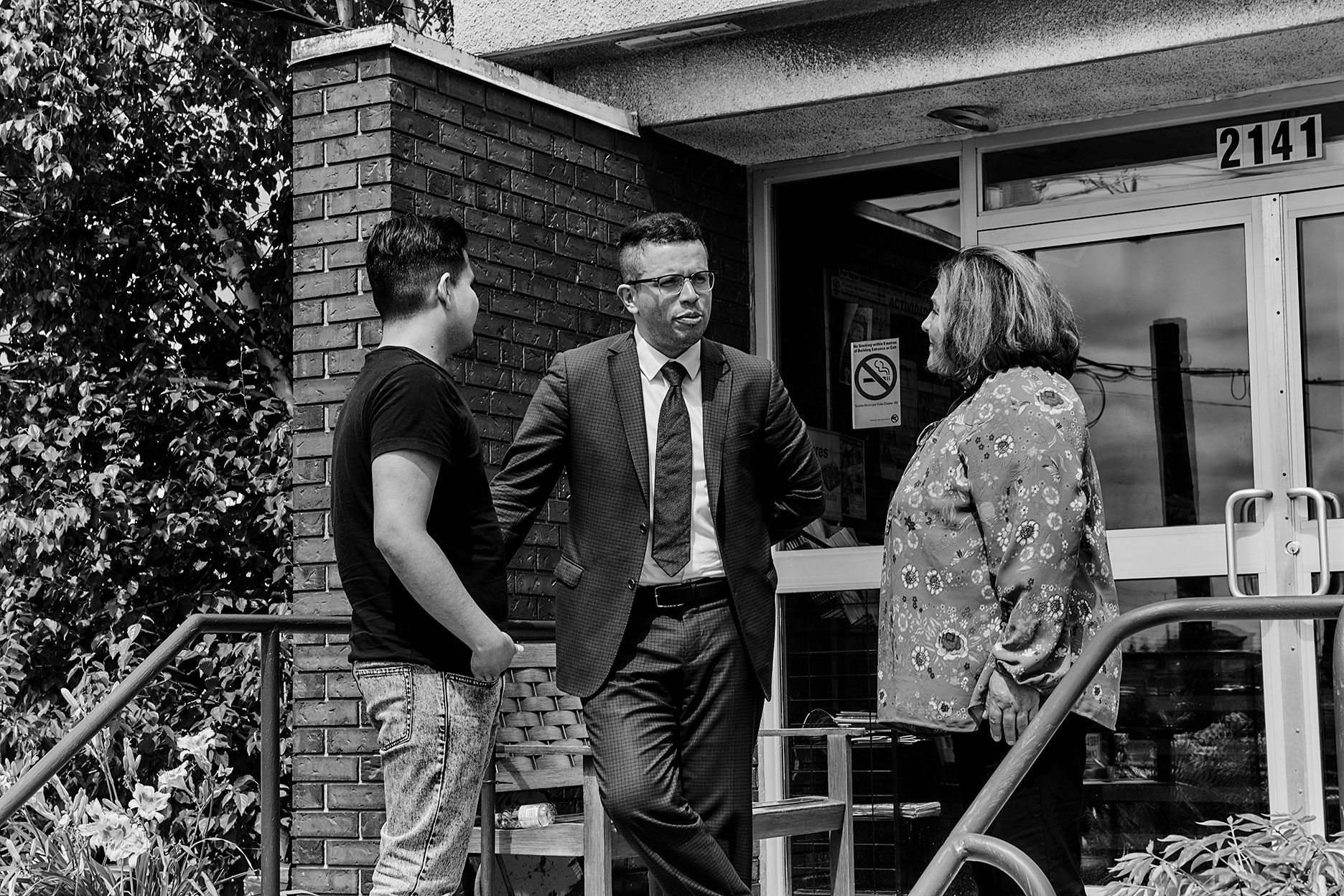
At least once a month, Cuellar visits the Centre for Spanish-Speaking Peoples in Toronto to offer legal advice to women in need of help. During his visits, he often chats with staff members at the centre.
IT’S BEEN SIX YEARS SINCE CUELLAR first showed up at the Centre for Spanish-Speaking Peoples to offer pro bono legal advice. It began as a half-day of meetings. But it has since grown into a full day of consultations, as well as periodic pro bono workshops on common family-law questions. He also comes in for extra consults when he can.
For Cuellar, the work is personal. Along with his two brothers, he was raised by a single mother who immigrated to Canada from El Salvador. His father did, too, but he now lives in Quebec; and Cuellar has only met him once. And so, he understands what it’s like for a woman to raise a family, on her own, in a new country. “I saw my mom tough it out, going to work at 5 a.m. to put food on the table,” he recalls. “We spent time on social assistance when she was sick. We also lived in government housing. Those experiences have pushed me in this direction.”
But working in family law wasn’t an obvious choice. In law school, at the University of Ottawa, Cuellar seemed poised for a promising career in finance. He’d worked as a branch supervisor at Scotiabank, and he excelled in his business-law classes. His heart, however, wasn’t in it. “I found it hard to be impassioned about securities law or about a merger,” he says. “That path wouldn’t have been good for my soul.”
As a second-year law student, he took a summer job with a family lawyer in Ottawa. And shortly after graduation, he struck out on his own. And his younger brother, Joe, joined the business as the office manager. He hopes the firm can continue to grow. Then he can expand his reach even further.
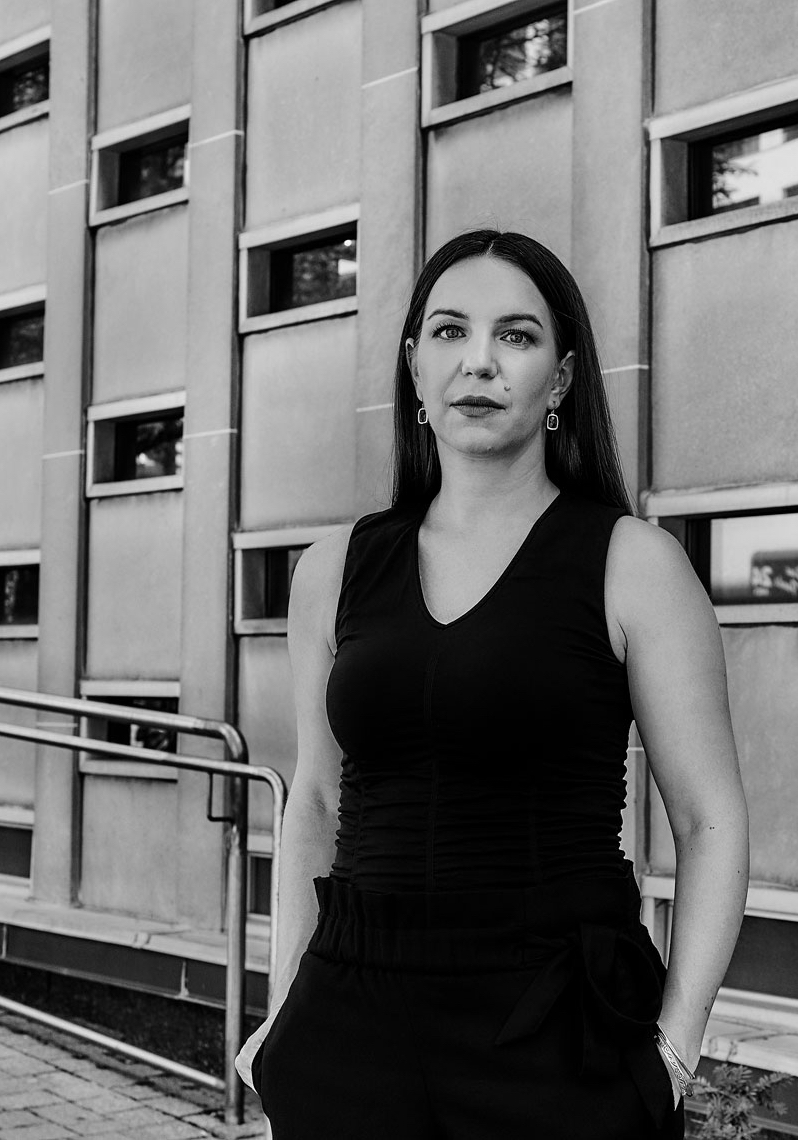
“I think I made more in my last year at Stikeman Elliott than I will ever make doing this job,” says Sarah Clarke. “But I’m okay with that.”
AS A SECOND-YEAR SUMMER STUDENT at Stikeman Elliott LLP, Sarah Clarke took part in a major pro bono case. Before law school, she’d completed a placement at the First Nations Child and Caring Society as part of her masters of social work. And so she knew that the organization was filing a human-rights complaint against the federal government, which had, over the course of decades, underfunded child-welfare services for First Nations. Clarke asked her firm if she could provide research support on the case. Stikeman Elliott gave her the green light.
Thirteen years later, the 40-year-old, who now runs her own firm, is still on the file. And Stikeman Elliott, as a firm, is also counsel on the case. The courts have long ruled that decades of chronic underfunding were the result of state-sanctioned racial discrimination. But whether victims are entitled to a settlement — and the value of such a payout — remains up in the air. Earlier this year, Clarke delivered her final argument on this topic. If she’s successful, the government could pay out more than $1.8 billion to as many as 54,000 children. Clarke is still on the case as pro bono counsel.
Her legal career began on Bay Street, where she summered, articled and worked for four years as an associate at Stikeman Elliott. Then she went to Hensel Barristers, an Indigenous-rights firm in Toronto. And two years later, she opened her own family-law firm.
Over time, Clarke has developed a specialty in child-protection cases. If a child is in a living environment that might be unsafe, the Children’s Aid Society can start a court application to have the child removed from their home. “Every family has problems, and some are struggling to parent their kids safely,” she says. “But every parent I’ve met loves their kid. And, more broadly, we don’t build a stronger and more productive society if we can just walk into someone’s house and take their children away.”
Born and raised in Toronto’s upscale Rosedale neighbourhood, Clarke grew up watching her single mother, Pat Robinson, rise to partner at Goodmans LLP. Robinson eventually left to start her own firm, specializing in estate law. “If I was a smarter human being,” says Clarke, “I would work for my mom, inherit her practice and make Bay Street money. But I just can’t.” Her mission is to restore some balance to a world in which some people, by no fault of their own, are born have-nots.

Clarke’s family-law firm is located on Toronto Street in the heart of downtown. She shares office space with her mother, estate lawyer Pat Robinson.
No one can build a career on principle alone. Despite her passion for justice, Clarke cannot afford to ignore her bottom line. To keep money flowing into the business, she prioritizes cases that bring in a guaranteed income: separations and divorces. In her solo practice, she has never charged more than $350 an hour.
At this stage in her career, she has accepted that her compensation will never reach Bay Street heights. “I think I made more in my last year at Stikeman Elliott than I will ever make doing this job,” she says. “But I’m okay with that.”
IN APRIL, the Ontario government made a stunning announcement: it was going to slash its legal-aid budget by $133 million. Or, to put a finer point on it, by 30 percent. The impact is already on wide display. Community legal clinics are laying off staff lawyers; others have suspended some of the services they provide. In the area of immigration and refugee law, Legal Aid Ontario has stopped issuing certificates for most cases. Thousands of newcomers to the country now sit in paralyzing legal limbo.
Sofia Ijaz, a refugee lawyer in Toronto, knows that the consequences of these cuts will be severe. “There are people who will lose their cases and be deported,” says the 30-year-old. “Not because they have a weak refugee claim, but because they can’t afford a lawyer.”
Ijaz has always had a singular focus on the plight of refugees across the world. “As a Muslim woman and racial minority,” she says, “I have always wanted to be an advocate for those communities.”
Throughout her life, she has made good on that promise. Ijaz grew up in Toronto, but, after high school, she studied foreign affairs at the University of Virginia. As an undergraduate student, she helped migrants fleeing the Iraq War settle in the United States.
In 2009, she graduated from university and moved to Syria to volunteer with a United Nations agency that supports Palestinian refugees. She also studied Arabic. It was during that time that she applied to law school. “I wrote my application in a café in Damascus,” she recalls. “It’s strange and unsettling to think that, nine years later, Syria is in the middle of one of the worst refugee crises in history.”
After law school, at the University of Toronto, she articled at Cavalluzzo LLP, a small human-rights firm. The following year, she moved to Jared Will & Associates, an immigration-and-refugee firm near Kensington Market. “I’ve always felt like there is something different about this place,” she says. “The firm shares my values.”
Even before the latest round of legal-aid cuts, Ijaz had to absorb unexpected costs and unpaid invoices. In one case, she represented an Afghan woman, who, having lived in a war-torn part of the country, was living with severe PTSD. To prove that her client was too mentally distraught to testify, Ijaz needed to include a psychological report in the refugee claim. But Legal Aid Ontario wouldn’t cover the full cost of the assessment. It contributed $300; the firm paid the rest, for which it was never reimbursed. The psychologist told Ijaz it was the worst case of trauma he’d ever seen. It’s not just the firm that eats costs. Instead of earning a salary, Ijaz works on a fee-split arrangement, which means that she earns a portion of the hours that she bills.
This means she feels the pressure to drum up business. To work entirely for free, after all, isn’t an option. But if the government won’t help her clients, she will step in and fill the gap. “To tell a client, ‘Sorry, I can’t represent you’? That would be devastating,” says Ijaz. “I would feel responsible.”
IN THE SUMMER OF 2017, Caryma Sa’d launched a landlord-and-tenant practice, pretty much by accident. The previous year, she had articled at Lenczner Slaght Royce Smith Griffin LLP, an elite litigation boutique, but at the time she was trying to strike out on her own. That’s when she bumped into a former mentor who had an eviction case that he wanted to pass along. Sa’d agreed to take it. And, quite suddenly, it became a major news story. Her new clients were a Chinese couple who lived in a Rosedale apartment. The building management had filed eviction papers, accusing their tenants of bad behaviour. The couple, in turn, claimed they were the target of racism. In the end, Sa’d won. And not only that: the case received widespread media attention, placing Sa’d in the spotlight.
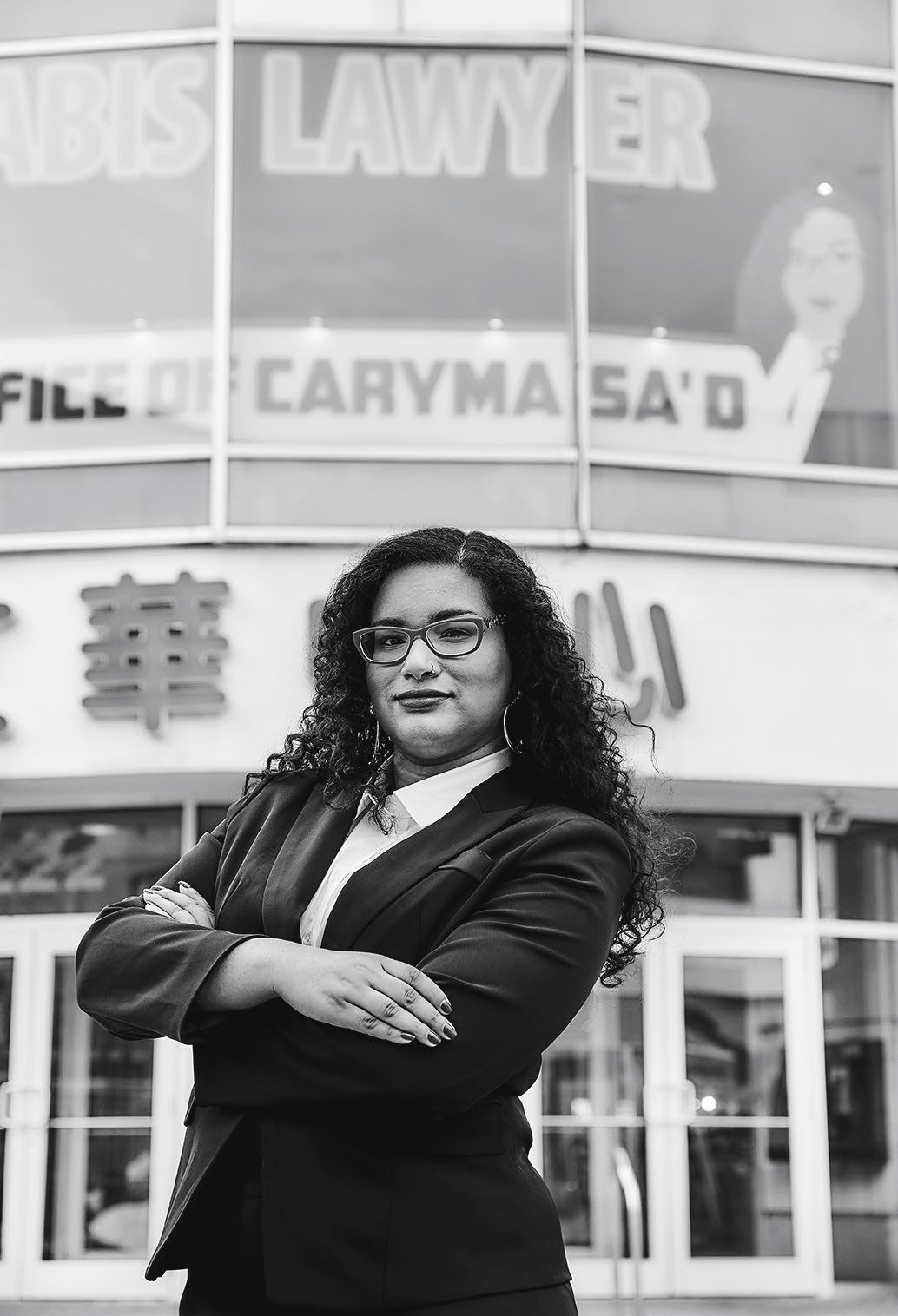
Caryma Sa’d runs her own firm, which offers legal services in a range of practice areas, including cannabis, criminal-defence and landlord-and-tenant law. Her office at Chinatown Centre features bold signage.
This new-found public persona was a boon to her practice. Sa’d started to get calls from distressed tenants across Ontario. During that period, she didn’t even have an office; she worked at home or in space at a chambers that she rented on a short-term basis. But as business surged, she was able to rent a small, low-cost office inside Chinatown Centre, the large shopping complex on Spadina, a couple blocks south of Dundas.
Sa’d carries a broad caseload, which includes everything from eviction to rent disputes. Though the legal issues in each file are often simple, the procedures of landlord-and-tenant law are so complex that self-representation is out of the question. “It’s frustrating,” says the 30-year-old. “It should be easy for people to resolve these disputes without legal assistance, but that’s not the case at all.”
Still, Sa’d tries to keep her rates low. Her initial two-and-a-half-hour consultations cost $600 — not cheap, but not prohibitive to most people, either. “I charge block fees,” she says, “so there’s no uncertainty.” The main reason she doesn’t feel compelled to jack up her prices is that she requires clients to pay upfront. This way, she doesn’t waste time tracking down unpaid bills.
For clients who can’t afford a full session, Sa’d has another option: they can purchase a one-hour consultation with a recently called lawyer, whom she has trained to provide basic legal advice in the practice area. This novel solution allows her to offer a low-cost alternative to clients, while also providing occasional freelance work to junior lawyers at the start of their careers. The cost of this service is $350. These rates are all displayed openly on her website.
She also represents landlords. In general, it pays better to pursue an eviction than it does to defend one. This type of work helps her manage her cash flow and keep the business afloat. “My business is still a work in progress,” says Sa’d. “But I like to think that my story could inspire other fledgling lawyers to carve their own path.”
OUR LEGAL SYSTEM IS BUILT, in a fundamental sense, on the backs of lawyers’ goodwill. Clarke often upholds justice free of charge. “I constantly eat time on legal-aid certificates,” she says. “Every single person who does a good job eats time.”
This massive social problem has no quick fix. In addition to a huge influx of public money — to hire judges, to increase legal-aid funding, to reduce bottlenecks at every junction of the legal system — Clarke believes that more work needs to happen at the law-school level. “We need to be training lawyers in a broader way, with a greater focus on access to justice,” she says. Legal education, in her view, needs to go beyond reading articles about the importance of the rule of law. It also has to engage with the question of how young lawyers can dedicate parts of their careers to such causes in real-life practice. “Not everybody has to do what I do,” she says. “But I think it has to be an expectation that you’ll do something in a meaningful way to protect the system of justice.”
In the meantime, there are lawyers who have found a way to earn a living while sustaining their commitment to justice. Take Cuellar. He has an affordable lease on his Subaru, though he often takes the streetcar to his office. In October, he purchased a home with his partner: a two-bedroom house in Toronto’s east end. “The business is stable,” he says. “There is a way to do social justice that doesn’t mean being a ‘starving lawyer.’ You can blend social justice into your business and make it work and be profitable.”
This story is from our Fall 2019 Issue.
Photography by Luis Mora


